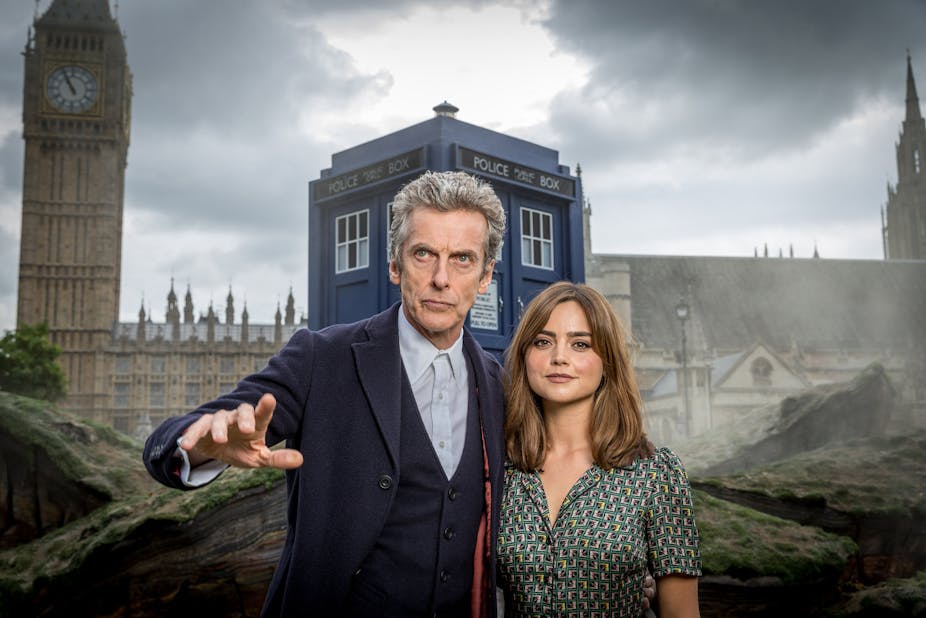Warning: this article contains spoilers.
The fully-fledged arrival of a new Doctor is always a major event in Doctor Who. In that respect, Deep Breath is business as usual for a BBC brand that has just been promoted across a hype-regenerating “world tour” taking in the US, Mexico, Brazil, Australia, South Korea, London (all of which have BBC Worldwide offices) and Cardiff, where the show is made. Finally, rather than picking over the hordes of teasers and trailers, and sifting through universes of sci-fi spin and photo ops, now we can finally start to properly assess the new occupant of the TARDIS.
Showrunner Steven Moffat is keen on lampooning his leading men – where Matt Smith was given dialogue about his somewhat striking chin, here Capaldi discusses his “attack eyebrows”; facial features which he deems so prominent that they could threaten to set up independently from the rest of his visage. They loom over the newly refreshed title sequence. Moffat is keen for Capaldi to riff self-referentially on his Scottishness – when he notices his own accent he gleefully says “I can complain about things!”. When the TARDIS arrives in an anonymous contemporary city centre – filmed on Cardiff’s Queen Street – it’s identified as Glasgow (where Capaldi hails from) rather than the traditional London, as has often featured in the past. Another wink to the audience wondering just how Scottish this era of Doctor Who might become, and another acknowledgement of the new leading man.

Capaldi, like David Tennant before him, is an actor who loved Who growing up as a fanboy. There may have been a danger of too much reverence, or too much insider knowledge, but Capaldi is enough of a fan not to give way to slavish imitation. His newly-regenerated Doctor is exaggeratedly bonkers (this is a tradition in the series), but soon begins to settle into an aura of alien otherness twinned with terse steeliness.
This isn’t an immediately friendly hero figure, but nor is he quite the “anti-hero” that William Hartnell’s Doctor began life as, back in 1963. Exploring the grey (or should that be the distinguished and silvered?) areas between hero and anti-hero, Capaldi’s performance is one of constant nuance and detail. Whilst the story itself whizzes by in very broad brushstrokes (a dinosaur! clockwork droids!), Capaldi’s Doctor is a more subtle and pointillist portrait. He bristles with moments of commanding elegance and energy. He’s at his best when subtly mirroring the tale’s villain: admonishing it for having recreated itself so many times that there’s little or nothing left of its original self, Capaldi artfully conveys the irony that such a description could just as well apply to the Doctor. It’s the merest flicker of a moment, but you just know he’s thought about it and crafted it.
Fans who had been holding their breath to see how Peter Capaldi tackled this icon of British TV can now let out a sigh of relief. And in seeking to reassure audiences of the programme’s continuity – and companion Clara that the new figure is still her Doctor – this episode certainly brings out the big guns. Playing with possibilities of time travel in a near fourth-wall-breaking moment, we are assured by his very popular predecessor that this new version of the Doctor is indeed the real deal, but that he (Peter Capaldi) needs Clara’s (i.e. our) support.

For me, this sequence felt faintly disrespectful to the imagined audience, implying that viewers wouldn’t be able to accept a non-young Time Lord without some special pleading and a big dose of emotional manipulation. Bringing back the “old” Doctor in a new Doctor’s opening story isn’t just clever and “timey wimey”. Placing such an unusual, almost anxious, stress on continuity threatens to momentarily over-shadow the show’s capacity to move forward, transform itself, and let go of the past.
That aside, the episode has monsters and action sequences and clever twists and turns. It seemingly sets up a mysterious new story arc. But really it’s about introducing the world to an older Doctor, something not seen on an ongoing basis since the show’s return in 2005. This contesting of our consumer culture’s fixation on youthful appearances and youth-cultural trends is a sharp and thoughtfully challenging move for an established family show. If this were an outright commercial programme, rather than something cloaked in the BBC’s public service identity, I doubt whether Peter Capaldi would have been cast: looked at from a brand-image point of view, he’s a considerable departure from the past few TARDIS incumbents.
Sure, by arguing that we need to gaze through the veil of outer appearances, Steven Moffat’s screenplay strangely keeps drawing attention to those very surfaces. But there should be no doubt at all, and no grey areas, about whether Peter Capaldi makes a good Doctor. More than a good man, this new Doctor promises to be a great Time Lord.

